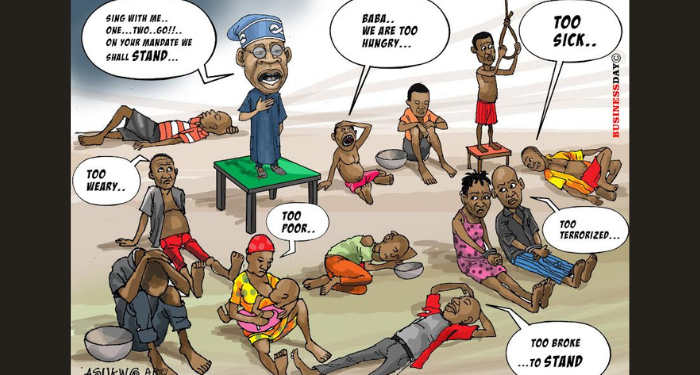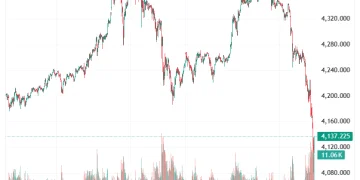Economy: Traumatised Nigerians look beyond Gov’t for survival
Nigerians are going through a traumatic period. Many years of expecting good governance from their elected leaders have not yielded the desired result.
Most times, promises made during campaigns are fulfilled in breach. The often-talked-about social contract is not working.
While it would seem that elected office holders now only take good care of themselves, their families and acolytes, citizens have moved on, looking for their survival outside government.
Policies aimed at positively impacting the lives of citizens are not working as a result of poor concept and implementation. The economy is in the doldrums.
Nigeria, the largest economy and most populous black nation in the world, is facing a challenging period as its citizens grapple with the aftermath of President Bola Ahmed Tinubu’s economic reforms and a carryover of the eight-year inept governance by Muhammadu Buhari.
Since President Tinubu assumed office, he has implemented a series of bold economic measures aimed at attracting foreign investments. These measures include ending fuel subsidy and floating of the naira.
While government officials argue that these actions are vital for the nation’s long-term prosperity, the immediate consequences have been felt by the Nigerian populace, albeit in the negative.
Inflation rises to unprecedented levels
Inflation or a general increase in prices and fall in the purchasing value of money surged to 32.84 percent as of November 2023, according to the National Bureau of Statistics (NBS). This has led to soaring healthcare and medication costs, as well as tripled fuel prices in the country that rippled through transportation and food expenses, crippling the daily routines of Nigeria’s 200 million citizens.
Over the course of six months, the naira has lost approximately 41 percent of its value against the dollar. This depreciation has driven up the costs of imported goods and debt payments in foreign currencies, further straining the country’s economy.
A soaring poverty rate
Worryingly, Nigeria’s poverty rate has climbed from 40 percent in 2018 to 46 percent in 2023, as reported by the World Bank. This surge in poverty has adversely impacted approximately 104 million people, putting a spotlight on the urgency of addressing economic challenges.
Amid the economic turmoil, opinions reflect the prevailing sentiment. George Ubon, an accountant in Lagos, acknowledges the administration’s intentions but emphasizes the importance of effective implementation: “President Bola Ahmed Tinubu has a good plan, but he must be able to implement them. He needs to reshuffle more sectors like he did in the aviation industry to move the country forward.”
For many like Ubon, faith in divine intervention is a prevailing coping mechanism:
“Though it has not been easy, I thank God. I trust in God and I don’t look up to man. I believe with God, something can still happen,” he said.
Conversely, Lucky, who works in the logistics industry, expressed a lack of confidence in the current administration. He anticipated that things might worsen, stressing the urgent need to reduce the exchange rate of the naira to the dollar. This, he argued, would lower the prices of essential commodities and basic food items. He lamented, “This regime affects us all. The price of food has increased dramatically. The cost of rice, a staple food, has tripled.”
Dayo Adeoye, an auditor in Lagos, urged patience, acknowledging that the reforms may seem drastic but asserting that they were necessary for Nigeria’s future. He advocated giving the President at least a year to see the effects of his initiatives and reforms, urging vigilance to prevent new avenues for waste as subsidies were being cut.
“President Tinubu needs more time to demonstrate the effectiveness of his reforms,” he said. “I believe we should give the President at least one year to see the effects of what other steps he is going to take to at least reduce the suffering of people.”
A Lagos resident, Kayode Williams, offers a pragmatic perspective, acknowledging the complexities of managing Nigeria’s vast population: “You can’t expect somebody to take over power in six months and expect miracles to happen in six months. I think he is going to make the country better, not perfect.”
Speaking further, Williams noted the complexity of managing a diverse nation like Nigeria, stating, “Managing eight people in a compound is challenging; imagine managing the entire country. It’s not easy to govern Nigerians.” He believed that President Tinubu’s efforts would eventually lead to improvement, even if perfection remained elusive.
Also, adding his voice, Kalu Ukechukwu, a 43-year-old security personnel, remained skeptical about the prospects for positive change. Reflecting on the President’s first six months in office, Ukechukwu concluded, “Mere observation of President Tinubu’s actions in these six months suggests that nothing substantial is changing for the better.”
Addressing the question of whether Nigerians should endure until the end of President Tinubu’s tenure, Ukechukwu compared the situation to “To your tents, O Israel,” implying that individual efforts might be the key to progress.
Olusegun Asoyinkule, a project manager from Ogun State, expressed concerns about the lack of empathy from the government amid the prevailing hardships. He urged the government to address basic needs like food, water, shelter, and electricity promptly, as these were fundamental to easing the suffering of the people.
While several coping mechanisms have been tested, Asoyinkule acknowledged that it was becoming increasingly difficult for citizens. He lamented, “Things cannot continue like this, but when we see signs of the government showing sympathy or empathy, then we’ll know it’s working. But seeing the affluent lives politicians still lead, they don’t seem to care.”
Government’s response and the role of data
In a seeming response to these concerns, President Tinubu emphasised the importance of comprehensive data for informed decision-making.
Speaking at a conference in Lagos where he was represented by Kashim Shettima, Vice-President, he said: “The inadequacy of data had impeded Nigeria’s ability to make informed decisions, resulting in missed opportunities and suboptimal outcomes.”
He highlighted the strategic placement of tech-savvy Nigerians in government positions to address this issue.
World bank’s perspective
While President Tinubu’s economic reforms have drawn mixed reactions from Nigerians, the World Bank recognises their significance. The international organisation urged the Nigerian government to sustain and fully implement these reforms while coordinating fiscal and monetary policies to ensure the nation benefits from the ongoing adjustments.
Shubham Chaudhuri, World Bank Country Director for Nigeria, urged coordinated actions in the short to medium term to ensure Nigeria benefits from these adjustments.
“Now is the time to truly turn the corner by ensuring coordinated fiscal and monetary policy actions in the short to medium term,” Chaudhuri said in a press release. “Continued reform implementation can ensure that Nigeria benefits from the difficult adjustments underway,” he further said.
In the face of these challenges, Nigerians find themselves at a crossroads, torn between optimism for a better future and the sobering realities of their daily lives. As the new year nears and the Tinubu administration navigates the turbulent waters of economic reform, Nigerians wait with bated breath, seeking tangible solutions to their enduring struggles.








